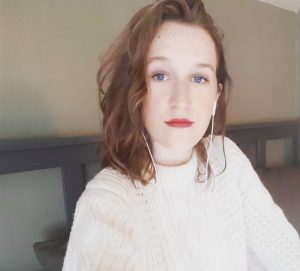B y Colorado Review Social Media Manager and Associate Editor Jordan Osborne
y Colorado Review Social Media Manager and Associate Editor Jordan Osborne
Often, when looking through an issue of an unthemed journal, I’m surprised at the connections and synchronicities at work across the pages, especially when it seems that two pieces are inhabiting the same or similar emotional landscapes. In the Summer 2020 issue of Colorado Review—in which I found the poetry selected by Camille Dungy to be especially stunning—two poems in particular stood out to me while I was typesetting the issue: Maggie Queeney’s “What Kind of Animal You Would Be If You Could Be Any Animal” and Isaac Williams’s “Geospatial.”
Visually, both look entirely different on the page; where Queeney’s work is a tidy nest of four quatrains, Williams’s work is a breathy block of varying line lengths. Not even second cousins, formally speaking. Even the titles don’t suggest a familiarity or proximity, and these things are what makes their similar threading so appealing to me—it’s in the way each poet weaves varying images together towards the same direction or landmark.
Williams writes, “I think about how to leave smog machine / net of roads maybe Oregon / maybe Massachusetts” and Queeney’s speaker says:
. . . Omnivorous, I nose the sides
of highways, the arrangement of other women’s
hair, shining yards of tinsel torn from a float.
Between these two sets of lines, we can find commonality in the feeling of being of two worlds, two minds, two places, two identities. The speaker of one poem’s oscillation between Oregon and Massachusetts is certainly omnivorous, in the sense that their imagination can easily latch onto and find sustenance in the idea of two completely different places. And what is a net of roads without the sides of highways?
Which is all to say that both of these poems hinge on hunger—on appetites and primal forms of wanting that are difficult to name and therefore must be written into poems. “I have my tastes, / but I would take, finally, anything. There is no end / to the hunt or eating,” Queeney writes, and Williams:
I am looking into being the vase that holds flowers
the vase that holds Colorado River water
and Lancaster flowers now I want to be the flowers
now I want to catch on fire with the sun.
Both poems speak brilliantly to what it means to be a living being in a world such as ours. Wanting in its various forms is a part of existing as we do—as bodies in a world of other bodies. Hunger is examined more closely as the human condition—ceaseless desire and the void that meets us every morning. If this is the case, if to be human is to be hungry, then what does this say about the societies we’ve created? The ways in which we conduct our daily lives?
What comes to mind, for me, is the famous ending to “The Archaic Torso of Apollo” by Rainer Maria Rilke: “You must change your life.” These poems have latched onto this feeling and have taken it in different directions, neither of which provide either a solution or a change. The speaker of Williams’s poem feels the urge to change, to literally move their life to another place, but doesn’t—or rather, hasn’t yet decided whether or not following that urge is worthy, if moving to a different location and changing their life will resolve, finally, the urges and hungers. The speaker of Queeney’s poem seems, if not at home in the perpetual wanting, then to be resigned to it, as if to say back to Rilke, “No—I mustn’t, thanks.” The wanting remains, and they are trying to come to terms with it by being honest about the things they want, the things they devour.
That two poets who (as far as I know) don’t know each other in the real world have both taken up this particular dilemma of living reveals just how indelible it is to all of our lives. The questions we have about how to silence the part of us that demands more at every given opportunity, turn, and intersection are part of what makes poetry necessary—no narrative structure that I’ve found (and I may be biased, I’ll admit) is as well-equipped to tackle questions that aren’t really questions and don’t have any answers. And so, these poems are more than just poems, they are case-studies in why poetry, the form of writing that has been the most questioned by society at large, is absolutely vital: because it lets what it means to be human remain messy and inexplicable.

Jordan Osborne is a third-year MFA candidate at Colorado State University, where she works as Social Media Manager and Associate Editor for the Colorado Review. Her work has appeared or is forthcoming in Canary, Rogue Agent, and Red Rock Review.